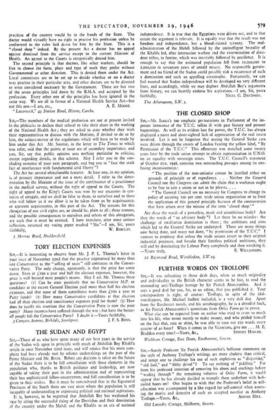THE CLOSED SHOP
SIR,—Mr. Isaacs's too emphatic protestations in Parliament of the im- potent innocence of the T.U.C. tallies ill with past history and present happenings. As well as its evident lust for power, the T.U.C. has always displayed a naive and short-sighted lack of appreciation of the real issues involved. Let it not be forgotten that outing the General Strike cars were driven through the streets of London bearing the yellow label, "By Permission of the T.U.C." This effrontery was matched some twenty years later by the trade union attempt to obtain representation in U.N.O. on an equality with sovereign states. The T.U.C. Council's statement of October 21st, 1946, contains two outstanding passages among its con- fusing inconsistencies:
" The position of the non-unionist cannot be justified either on grounds of principle or of expedience. . . . Neither the General Council nor the Congress can admit the claim that a workman ought to be free to join a union or not as he pleases. .
"The General Council see no necessity for Congress to change its policy of securing too per cent. trade union organisation or to limit the application of this general principle because of the controversies that have arisen over the misuse of the term closed shop.'" Are these the words of a powerless, meek and unambitious body? Are they the words of " an advisory body "? Let there be no mistake: the challenge of totalitarian domination is there ; the ambitions and aims which led to the General Strike are undamped. There are many things now being done, and many not done, " by permission of the T.U.C." I venture to prophesy that unless the trade unions revert to their original industrial purposes, and forsake their limitless political ambitions, they will end by dominating the Labour Party completely and then wrecking it.
—Yours truly, E. WILLIAMSON.
l2 Raymond Road, Wimbledon, S.W.rsi.


































 Previous page
Previous page